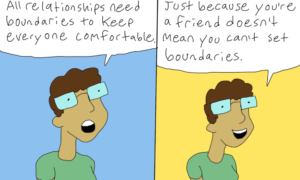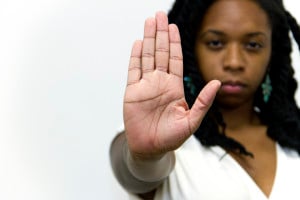By now, you have probably heard about the protests, generally led by Black students, spreading across college campuses around the nation.
These demonstrations are about a lot of things: the permitting of unsafe environments for Black and nonwhite students; under-representation in teaching and mental health staff and other faculty; anti-Blackness entrenched in engravings, building names, and other commemorations of racist figures; and the dismissal or failure to properly address concerns about racism on campus, to name just a few.
One thing that they are not, and should never have to be, about is the feelings of well-meaning white people as they struggle to grasp – hopefully willfully – the importance of the fight these students have taken on.
None the less, white people’s failure to understand how white supremacy works and the urgency upon which we Black folks act against it is nothing new.
For the past several centuries, whenever we protest, fight back and demand change, we are met with resistance from white communities ranging from physical violence to tears of guilt.
Even the non-violent Dr. Martin Luther King, Jr., now heralded by many well-meaning white people as a beacon, was harassed, jailed, beaten, and eventually killed for his anti-racism work.
Most of us would hardly feel responsible for any overt violence against us in response to our demands for justice, but for a compassionate heart – possession of which is why most of us have taken up this fight in the first place – tears can be harder to escape feeling liable for.
In anticipation or in response to those tears – which are expressions of white guilt or fragility – many Black people go out of our way to alleviate them by making our struggles address white people’s concerns first.
In the immediate wake of the campus demonstrations, I repeatedly saw some variation of the phrase “Pro-Blackness doesn’t mean anti-white” from Black friends and colleagues in reference to the events.
It’s perfectly true that a pro-Black person isn’t necessarily anti-all-white-people, as a great piece written here on Everyday Feminism explained.
It’s also true that pro-Blackness is necessarily anti-Whiteness – anti the construct upon which White Supremacy rests and from which all white people benefit.
I saw the declaration generally go without acknowledging the necessity of anti-Whiteness, while also functioning in much the same way the disclaimer “Not all white people are racist” functions, legitimizing the fear that directly addressing systematic problems might implicate everyone involved (not all cops are bad! Not all men are sexist! Not all straight people are queerantagonistic!).
More problematic than that, in many cases, it seemed to center the comfort of white people at the expense of the pro-Black cause – as if to say that pro-Blackness isn’t acceptable unless first all white people are safe.
In a society where Whiteness is the basis for race-based power, Black people in general cannot reasonably be a threat to white existence. We can, however, be a threat to white comfort and white feelings.
By expressing the need to make sure white people’s feelings were first placated before addressing racism, it seemed some people were coming precariously close to making white feelings more important than racism.
This is dangerous.
However, I certainly understand the urge. I have felt compelled to cater to white people and their feelings in race conversations on many occasions.
Sometimes, it’s helpful to take that extra step to acknowledge white feelings, not out of responsibility but out of experience-specific convenience. But if you are made to feel responsible, you might end up taking that step right off of a cliff.
Below are five legitimate reasons one might feel responsible for white feelings in race conversations – and why we are not.
1. White People Aren’t Used to Not Having Their Feelings Centered
A natural side effect of white supremacy is white fragility, defined by Westfield State University professor Robin DiAngelo as “a state in which even a minimum amount of racial stress becomes intolerable, triggering a range of defensive moves. These moves include outward display of emotions such as anger, fear, and guilt, and behaviors such as argumentation, silence, and leaving the stress-inducing situation.”
White fragility demands coddling, and those demands, especially if you care about the person doing the demanding, are hard to ignore.
Many times, the person insisting on our energy does not even know they are demanding it because they’re just so used to receiving it with little to no resistance. Sometimes, we aren’t aware we’re giving in.
But to submit to that demand without acknowledging it as an unfair one is to reinforce its legitimacy. White people have never had to question not having their feelings centered. If we also center them also without question, they will continue being most important, encouraging the very white supremacy we hope to deconstruct.
As Michal “MJ” Jones wrote in “4 Reasons People of Color Can’t Cater to White People’s Guilt – Or Their Tears,” the conversation about white feelings on race topics “isn’t about denying white folks humanity or their own personal hardships – it’s about the power dynamics, deflection, and even gaslighting that can happen.”
White people need to feel comfortable around race conversations, never mind the discomfort of Black people living in a racist system, for white supremacy to stay intact.
We are expected to hold the burden of our own feelings, which go unaddressed, as well as theirs, simply because of their white supremacy-based fragility.
And that is not right.
2. When Someone Feels Comfortable, They’re More Likely to Be Receptive
A large part of our desire to be concerned with the feelings of white folks in race conversations is the belief that people listen better when they don’t feel attacked. Perhaps if I could be soft enough with this person, we think, they might see my truth.
But there are limits to listening.
Not too long ago, I got into a major confrontation with a family member who claimed my writings on race offended their white partner.
Being someone I truly love, this was one of the white people around whom I was most careful with my words and actions involving racial topics.
Up until that point, I had never called them out on any specific acts of racism nor directed any accusations toward them. And yet, I still ended up offending, somehow.
With white feelings, it’s almost impossible to win. Winning the person’s comfort, you might gain reception, but what are you sacrificing? What is the limit to that receptivity?
Had I missed great learning opportunities with this family member by walking on eggshells around them, simply to lose in the end anyway? Would this feeling of “offense” have been mitigated if addressed more directly sooner?
By relying on someone’s comfort for their receptivity, as soon as you say something discomforting, you immediately lose whatever reception you gained.
If comfort is the prerequisite, one only listens for as long as it lasts and until what is said doesn’t threaten it.
Although you may find exceptions, in most cases, simple reception isn’t very helpful. A lot of the time, those things received only in comfort aren’t even the most important things needing understanding, because unlearning oppressive behaviors is inherently uncomfortable.
As the famous unattributed saying goes, “There is no growth in the comfort zone and no comfort in the growth zone.”
Anger at the truth of white supremacy is perfectly normal –white people have been lied to their entire lives about race and their own privilege, and discovering that lie can feel like a betrayal.
Unfortunately, this anger is oftentimes misdirected toward us, rather than white supremacy itself, which is a legitimate target of ire.
Allowing white people to experience sadness, anger, and other uncomfortable feelings is allowing them to be human, and if they are ever to sincerely dedicate themselves to overturning white supremacy, they need to be that first and foremost.
3. We Are Empathetic People
Most of us who are passionate about racism and its impact on our communities are so because we easily connect with the pain and suffering of others and want nothing more than to eliminate it.
Our empathy may often drive us to feel the discomfort of well-meaning white people, too. We might see our own flawed selves in them, and remember how hard it is to come to terms with participating in oppression.
Because empathy is basically how well you identify with another’s experiences, it’s almost always a one-way street when it comes to marginalization, as supremacy prevents those who benefit from it from fully connecting with those who don’t.
As I wrote previously, marginalized people “relying on (the empathy of non-marginalized people) almost always places the onus on the marginalized. They must reiterate how they are – and then be – much more like those who are not marginalized in order for their causes to matter.
“They must prove their pain in a way that their oppressors are willing to acknowledge. Sam Dubose’s head must be blown off publicly and violently, and those who desperately want to be on the officer’s side must judge his action to be one of unequivocal cruelty.”
Similarly, allowing non-marginalized folk to rely on our empathy is also destructive.
Their expectations for our empathy means we have to constantly be moving to meet white people halfway without any impetus for them to do the same.
I embrace my empathy and sensitivity to others’ emotions, but I am also learning that dependence on this skill, evident in the failures of both trying to force it onto others and in having it direct my every action, is a trap.
Empathy is a limited tool that cannot and should not be used as the solution to every problem. Recognizing the limits of empathy might alleviate some of the compulsion to take on responsibility for white feelings.
4. We Think We Have to Prove Something, When Proof Is Readily Available
When well-meaning white people get caught up in their emotions, sometimes it doesn’t feel like being gentle with their feelings could hurt anything.
If we just explained agreeably one more time, they might finally get it and we won’t have to do it again – a small sacrifice.
But when Black folks give disclaimers about our movement and what it is not, we have to recognize that the people we still feel need another gentle explanation have 450 years of explanations through this liberation struggle from which to learn.
Who still doesn’t know that Black lives mattering doesn’t mean other lives don’t?
Who still doesn’t know that destroying white supremacy doesn’t mean destroying white people?
Maybe these people genuinely don’t comprehend what has been explained over and over, but that could only be because they aren’t listening. Why aren’t they?
What will make them listen this time?
How much must a message be diluted, how respectfully must we compose ourselves, how non-threateningly do we have to speak in order to get them to hear us?
What are you willing to forfeit? Before succumbing to the pressure to cater to white feelings, we need to understand that when catering means whitewashing or playing respectability politics, we must not feel obliged.
It’s great to point well-meaning allies in the right direction, but it’s not our responsibility to expend our energy teaching each and every one of them, especially if they aren’t sincere in wanting to learn more.
If Not Us, Then Who?
As mentioned above, there are centuries of documented anti-oppression work from which well-meaning white folks can learn, if not in libraries across the country, on Google. But the importance of human-to-human learning and lack of access to even these spaces can’t be ignored.
This is where our non-Black and white turncoats who have deep understandings of the problems with centering white feelings come into play.
White people like Robin DiAngelo are creating space where other white people can analyze their fragility and learn not to place that burden on Black folks. This is necessary work. This is their work.
Of course, we should be wary when white people only listen to other white people when it comes to racism, as they are inclined to do.
Instead, white people should look to other white people to unpack their specific feelings, not to create a white anti-racist echo chamber.
Those facilitating these spaces should be constantly informed by people who experience the oppression being deconstructed.
There is nothing wrong with being sensitive to any other person’s feelings, but being sensitive to someone’s emotions does not mean you are the one required to change them.
Giving up on catering to white people is not giving up on white people. In fact, it’s the opposite – it’s believing in them enough to know that they will be okay without being babied.
Enough to know that white anti-racist leaders have a responsibility to their communities in roles that they shouldn’t expect us to fill. It is, in a sense, letting the proverbial bird fly on it’s own for the first time. It’s been time to let it go.
[do_widget id=’text-101′]
Hari Ziyad is a Contributing Writer for Everyday Feminism and a Brooklyn-based storyteller. They are the Editor in Chief of RaceBaitR, a space dedicated to imagining and working toward a world outside of the white supremacist cisheteropatriarchal capitalistic gaze, and their work has been featured on Gawker, The Guardian, Out, Ebony, Mic, Colorlines, Paste Magazine, Black Girl Dangerous, Young Colored and Angry, The Feminist Wire, and The Each Other Project. They are also an assistant editor for Vinyl Poetry & Prose. You can find them (mostly) ignoring racists on Twitter @RaceBaitR and Facebook.
Search our 3000+ articles!
Read our articles about:
Our online racial justice training
Used by hundreds of universities, non-profits, and businesses.
Click to learn more





















